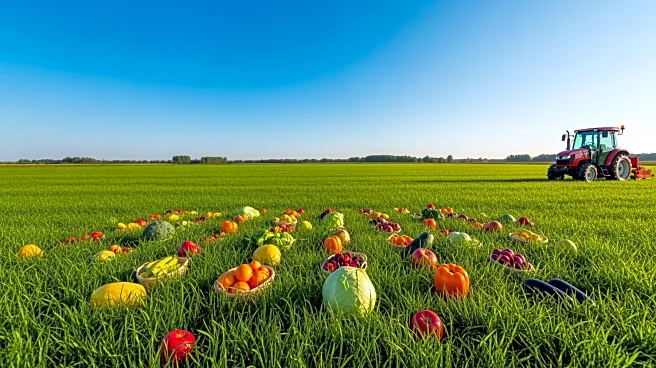What's Happening?
The Federal Government of Nigeria has announced new agricultural reforms aimed at addressing food shortages and boosting food production. These reforms are part of President Bola Tinubu's Renewed Hope
Agenda for food security and national prosperity. The Minister of Agriculture and Food Security, Senator Abubakar Kyari, emphasized the importance of agriculture as the backbone of Nigeria's economy, contributing significantly to the nation's GDP and employment. The reforms focus on ending hunger, ensuring food sufficiency, and reducing post-harvest losses, which are estimated to cost the nation over $10 billion annually. Key initiatives include mechanization, irrigation expansion, and improved storage systems to enhance food quality, farmer incomes, and price stability.
Why It's Important?
These agricultural reforms are crucial for Nigeria's economic stability and food security. By modernizing agricultural practices and reducing post-harvest losses, the government aims to strengthen the agricultural sector, which is a major employer and contributor to the GDP. The reforms are expected to reduce import dependence, boost market confidence, and position Nigeria as a leading food supplier in West Africa. This could lead to increased farmer incomes, improved food quality, and stabilized prices, benefiting both producers and consumers. The initiative also aligns with global efforts to combat hunger and malnutrition, contributing to sustainable development goals.
What's Next?
The government plans to implement several programs to support the transition to modern agricultural practices, including the National Agricultural Growth Scheme–Agro-Pocket and the Renewed Hope Agricultural Mechanisation Programme. These initiatives aim to expand mechanization services nationwide, improve rural infrastructure, and enhance financing options for farmers. The administration is also investing in climate-smart agriculture and developing new climate-resilient crops to ensure sustainable food production. As these reforms take effect, Nigeria could see significant improvements in food security and economic resilience.
Beyond the Headlines
The reforms have broader implications for Nigeria's socio-economic landscape. By prioritizing agriculture, the government is addressing long-standing challenges such as low mechanization and poor infrastructure, which have hindered the sector's growth. The focus on climate-smart agriculture and inclusive reforms highlights the government's commitment to sustainable development and resilience against climate change. These efforts could lead to long-term shifts in agricultural practices, fostering innovation and collaboration among stakeholders.











